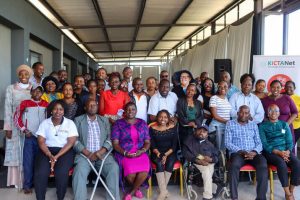Haya Patrick, we have work to do.
Have a good evening as well.
Jimmy Gitonga
@afrowave
On Tue, Oct 23, 2018, 21:57 Patrick A. M. Maina <[email protected]>
wrote:
> Jimmy, listers,
>
> It can assure you that execution will not be a problem. I have already
> received a good number of direct initial enquiries and expressions of
> interest from local innovators across multiple forums (not only ICT but
> engineering, agri, health / biotech) and they want the co-op launched like
> *yesterday*!
>
>
> It will be a willing member organisation and each member will be a *part
> owner* with shares. Founders will get special founding-member shares in
> recognition of their crucial formative role i.e. believing in the idea and
> taking the bold steps to make it real. It makes a lot of sense to join
> early, imo, but that is entirely optional.
>
> For those interested, please email me directly ([email protected]) to
> express your interest in membership and I will add you to the coop contact
> list in order to avoid flooding this list. Kindly indicate your location
> (county) in Kenya and whether interested as well.
>
> Interim requirements for members are broad for now (but this could change
> as we formalize) i.e. must be a Kenyan Citizen and have a creative
> entrepreneurial mind that is solutions oriented. Where others see problems,
> you see opportunities.
>
> To qualify as a founding official, you must be a Kenyan Citizen, and have
> an existing innovation that is 100% Kenyan owned. You should also have Gov.
> documented proof of ownership claim (e.g. patent / utility model /
> copyright / design model – or proof of application for the same).
>
> In all cases, please DON’T disclose any unprotected ideas or trade secrets
> until we have our constitution and idea protection framework in place.
>
> For those who have already messaged me, no need to resend as I’m still
> going through the messages. I am impressed by the enthusiasm so far which
> is very energising!
>
> Things will move *very fast* in the next few weeks as we formalize and
> register the organization, so don’t hesitate to get on board right away if
> interested in joining as a founding member or official.
>
> Have a great evening.
> Patrick.
>
>
>
>
> On Tuesday, October 23, 2018, 5:59:56 PM GMT+3, JImmy Gitonga via kictanet
> <[email protected]> wrote:
>
>
> Thank you Patrick for a comprehensive look at the cons of the Whitebox. We
> have seen so many of these “innovation harvesting” competitions, hackathons
> and organisations, we should have learnt something by now.
>
> Having been part of an award winning team at the Pivot East conference, I
> can tell you what it takes to “impress” the judges. To get that the winning
> idea to escape gravity is where the work is. Then, VCs were not serious. I
> don’t know about today. But one thing that has remained the same is the
> rhetoric.
>
> I expect whitebox to spectacularly fail. The guys with good ideas are
> executing them against all odds. If we don’t fix the virtual infrastructure
> like “idea/innovation protectionism” and get everyone to understand this
> requires all sectors to pull in the same direction, let us at the very
> least grow the human capital through the Andelas and Moringas of this world.
>
> One day we will build everything here, constantly innovating and iterating
> to stay ahead of the sharks. Right now, I imagine that trying to bring
> innovators into a cooperative group is like herding cats. We are not ready
> yet.
>
> Patrick has given us very good ideas. But execution …
>
> Regards,
> Jimmy Gitonga
> @afrowave
>
>
> ———————————————————————-
>
> Message: 1
> Date: Tue, 23 Oct 2018 13:05:01 +0000 (UTC)
> From: “Patrick A. M. Maina” <[email protected]>
> To: “[email protected]” <[email protected]>
> Subject: Re: [kictanet] Article – Protecting Ideas: The Government
> Whitebox is out…
>
>
> So what now?
> In my previous message, I discussed Pipeline commoditization, an
> exploitative model used by VCs / large corporations to mine ideas cheaply
> at the expense of Innovators, and which relies primarily on “greyzone
> ethics” application of behavioral science principles (e.g.?opportunity
> baiting in poor countries).
> Remember, you are NOT “the chosen one”. There is no such thing. It is an
> *illusion* created to trick you into acting against your own interests.
> In a given “innovations competition”, even if just 100 submissions are
> made, your odds of being the “chosen one” are terrible at 1/100. In many
> cases, more than 1,000 submissions are made and it is more likely you will
> be among the 980 hopefuls who don’t get chosen.?
> This doesnt mean that the “chosen ones” end up with a better deal (many
> regret) because they often get taken over and the local founder is turned
> into a “ceremonial CEO”; a pseudo-employee with no real decision making
> authority and a seriously compromised ownership structure (can be kicked
> out of own business).?
> What REALLY happens behind the scenes in such competitions is that the
> sponsors get a *free* brainstorm of 1,000 creative ideas (the real prize
> for them), from our best, albeit gullible, minds, while being only loosely
> obligated to pay a tiny amount ($10K-250K) for a tiny fraction of them
> (typically 1-20) under conditions if total subjectivity.
> As many founders have already observed, the concept of “judges” or “idea
> evaluators” in such competitions is utterly ridiculous. There is no one on
> this planet who is capable of identifying great ideas/businesses by relying
> on pitches (or even with the benefit of traction data). Such a person would
> already?be a GAZILLIONAIRE with his/her *own money* (and hence have no time
> nor inclination to judge competitions).
> Way forward:
> 1. No matter how tantalizing the opportunity, the odds for all of us
> improve *only* when we *unite* and negotiate with *one voice*.
> 2. Let’s build leverage:
> a. Innovators ought to be well represented in the boards that
> conceptualize these ideas / programs so that their interests are considered
> from the onset as key stakeholders.
> b. IP policies and laws need to be contextualized and indigenized to level
> the playing field for indigenous Innovators. Some partial aspects of this
> issue were very well articulated in a recent article by Dr. Bitange Ndemo.
> c. The time has come for innovators form a *collectively owned*
> cooperative society whose primary mandate will be to *aggregate* and
> *commercialize* indigenous innovations through *licencing* partnerships
> with Gov and Corporate entities.
> In addition to direct partnerships with Innovators, our cooperative entity
> will partner with willing incubators as well, offering a solid “next step”
> after incubation/PoC.
> It will act as a formidable shield for Innovators (protecting them from IP
> predators) which will result in massive negotiation leverage and help
> create numerous *jobs* as well as *wealth* (which will incentivise more
> innovation).
> We can start by forming a core team (abt 3-5 people max) right away, to
> get started with the formation, structuring and popularisation of such an
> entity.
> [Permission is granted to anyone interested in republishing this in
> tech/innovation blogs, forums, periodicals or media with attribution. Would
> appreciate if you let me know when you do so and send me a link.
>
>
>
> Thanks.
> Patrick.
>
>
>
> On Tuesday, October 23, 2018, 2:12:24 PM GMT+3, Patrick A. M. Maina
> via kictanet
>
> Sounds good in theory but in practice our IP landscape is woefully
> inadequate because it is a copy-paste framework that lacks local context.
> 1. As a poor country it is a given that most of our Innovators? will be
> starved for (and thus easy to bait with) capital.?
> 2. The lure of easy cash / validation is powerful and irresistible. It
> short-circuits even the most brilliant minds, causing each participant to
> individually fantasize that he/she is the “chosen one”. Yet even if just
> 100 submissions are made, your odds of being the chosen one are terrible at
> 1/100.?
> This is classic *Game Theory* in action where self-interest decisions by
> individual actors result in a less favourable outcome for all.?
>
> 3. When you don’t have leverage (e.g. something that *only you* can offer)
> you can’t negotiate. No one will sign an NDA with you. I call it pipeline
> commoditization. If, by applying game theory principles, a healthy flow of
> unprotected ideas can be guaranteed, why would anyone sign a true NDA with
> an innovator? Ideas are not “worthless”, they are the most crucial
> ingredient for execution (otherwise why did cash-rich execution King
> Waymo/Google go after Uber for alleged theft of AV ideas, which they valued
> at $500M???)!
> Pipeline commoditization relies on *brainwash* and *capital baiting* to
> unfairly swings the odds in favor of capital gatekeepers… Come on, play
> our idea lottery and Win! Win! Win! Are you “the chosen one”? We have
> “judges” who have never invented/innovated anything, many of whom are
> career employees with zero startup experience, which makes them PERFECT
> experts in judging great ideas/startups. These experts will decide who
> proceeds to level 2. Gamble with us and WIN BIG!
>
> We have to shift this model from a gambling / lottery system to a business
> negotiation system. My next message will have some concrete ideas on how to
> do this.
> Patrick.
>
> _______________________________________________
> kictanet mailing list
> [email protected]
> https://lists.kictanet.or.ke/mailman/listinfo/kictanet
> Twitter: http://twitter.com/kictanet
> Facebook: https://www.facebook.com/KICTANet/
> Domain Registration sponsored by www.eacdirectory.co.ke
>
> Unsubscribe or change your options at
> https://lists.kictanet.or.ke/mailman/options/kictanet/pmaina2000%40yahoo.com
>
> The Kenya ICT Action Network (KICTANet) is a multi-stakeholder platform
> for people and institutions interested and involved in ICT policy and
> regulation. The network aims to act as a catalyst for reform in the ICT
> sector in support of the national aim of ICT enabled growth and development.
>
> KICTANetiquette : Adhere to the same standards of acceptable behaviors
> online that you follow in real life: respect people’s times and bandwidth,
> share knowledge, don’t flame or abuse or personalize, respect privacy, do
> not spam, do not market your wares or qualifications.
>



